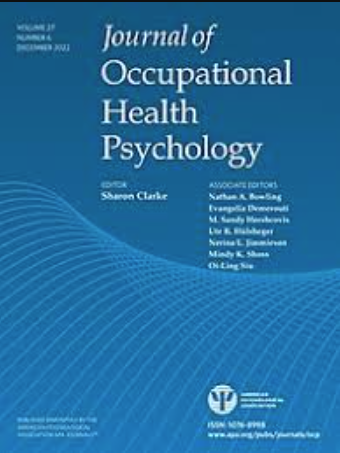How strategies of selective optimization with compensation and role clarity prevent future increases in affective strain when demands on self-control increase: Results from two longitudinal studies.
IF 3.9
1区 心理学
Q1 PSYCHOLOGY, APPLIED
引用次数: 2
Abstract
In modern working environments effective strategies for regulating goal-directed behavior and allocating and investing limited resources (e.g., selection, optimization, and compensation [SOC] strategies) should enable employees to cope up with job demands that require volitional self-regulation, thereby preventing strain over time. However, theoretical insights suggest that the beneficial impact of SOC strategies on psychological health depends on the degree to which employees experience clarity in their job role. To understand how employees stabilize their psychological health when demands increase over time, I examine interaction effects of changes in self-control demands (SCDs), SOC strategies and role clarity at an earlier point in Time on changes in affective strain in two longitudinal samples from different occupational and organizational settings (international private bank: N = 389; heterogenous sample: N = 313, 2 year lag). In line with recent conceptualizations of chronic forms of distress, affective strain involved emotional exhaustion, depressive symptoms, and negative affect. In support of my predictions, structural equation modeling revealed significant three-way interactions of changes in SCDs, SOC strategies and role clarity on changes in affective strain in both samples. In particular, the positive relationships between changes of SCDs and changes in affective strain were jointly buffered by SOC strategies and role clarity. The present findings offer implications for stabilizing well-being when demands increase over long time periods. (PsycInfo Database Record (c) 2022 APA, all rights reserved).当自我控制需求增加时,具有补偿和角色明确的选择性优化策略如何防止未来情感紧张的增加:两项纵向研究的结果。
在现代工作环境中,调节目标导向行为和分配和投资有限资源的有效策略(例如,选择、优化和补偿[SOC]策略)应该使员工能够应对需要自愿自我调节的工作需求,从而防止长期紧张。然而,理论见解表明,SOC策略对心理健康的有益影响取决于员工对其工作角色的清晰程度。为了了解当需求随着时间的推移而增加时,员工是如何稳定他们的心理健康的,我在两个来自不同职业和组织环境的纵向样本中,研究了自我控制需求(SCDs)、SOC策略和角色清晰度在较早时间点的变化对情感紧张变化的相互作用效应(国际私人银行:N = 389;异质性样本:N = 313,滞后2年)。与最近对慢性痛苦形式的概念一致,情感紧张包括情绪衰竭、抑郁症状和负面影响。为了支持我的预测,结构方程模型显示,在两个样本中,scd、SOC策略和角色清晰度的变化对情感应变的变化具有显著的三方相互作用。其中,情感应变变化与scd变化之间的正相关关系被SOC策略和角色清晰度共同缓冲。目前的研究结果为长期需求增加时稳定幸福感提供了启示。(PsycInfo Database Record (c) 2022 APA,版权所有)。
本文章由计算机程序翻译,如有差异,请以英文原文为准。
求助全文
约1分钟内获得全文
求助全文
来源期刊
CiteScore
8.20
自引率
5.90%
发文量
46
期刊介绍:
Journal of Occupational Health Psychology offers research, theory, and public policy articles in occupational health psychology, an interdisciplinary field representing a broad range of backgrounds, interests, and specializations. Occupational health psychology concerns the application of psychology to improving the quality of work life and to protecting and promoting the safety, health, and well-being of workers. This journal focuses on the work environment, the individual, and the work-family interface.

 求助内容:
求助内容: 应助结果提醒方式:
应助结果提醒方式:


